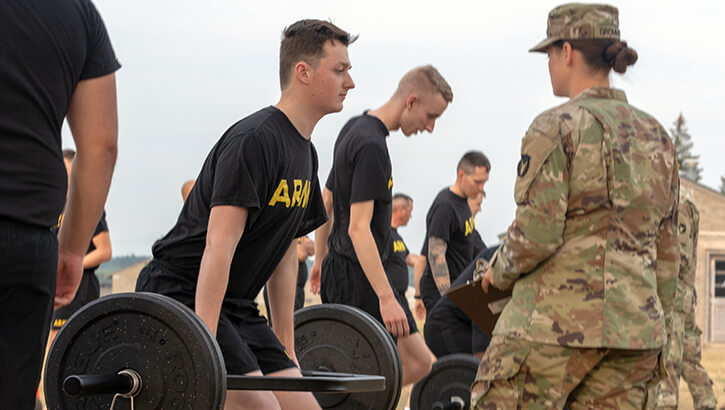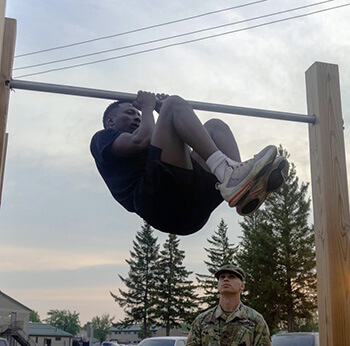As Fitness Tests Resume, Troops Seek Post-COVID Exercise Routines
 Soldiers assigned to the 1-125 Field Artillery perform the maximum deadlift event during their Army Combat Fitness Test (ACFT) diagnostic on Aug. 20, 2021, at Camp Ripley, Minnesota. Designed with the latest exercise science and physical training insights, the ACFT empowers soldiers to complete a variety of combat tasks and will go into effect in the spring of 2022 (Photo by: National Guard Sgt. Mahsima Alkamooneh).
Soldiers assigned to the 1-125 Field Artillery perform the maximum deadlift event during their Army Combat Fitness Test (ACFT) diagnostic on Aug. 20, 2021, at Camp Ripley, Minnesota. Designed with the latest exercise science and physical training insights, the ACFT empowers soldiers to complete a variety of combat tasks and will go into effect in the spring of 2022 (Photo by: National Guard Sgt. Mahsima Alkamooneh).
Last year, as the global pandemic forced abrupt lifestyle changes across the country, many service members saw their exercise routines disrupted and their everyday physical activities reduced.
That's when Army Col. Patrick Donahue decided to find new ways to stay in shape.
"I was concerned about losing my physical fitness," Donahue, the brigade commander at the Uniformed Services University of the Health Sciences in Bethesda, Maryland, recalled in a recent interview.
"I enjoy my food and drink, and in order to maintain my physical fitness levels and caloric intake, I had to add a [stationary bike] and yoga to my regimen."
Donahue is among many service members who've reassessed their physical fitness needs in light of shifting lifestyles and COVID-era restrictions.
Making weight and passing semi-annual fitness tests have always been a challenge for some service members. It can prompt them to do a lot of unusual things: Think Saran Wrap and saunas (to sweat off a few pounds), or hemorrhoid cream (to shrink waistlines temporarily).
Passing the physical fitness exam - which includes meeting weight and body fat composition standards - can have a major impact on promotions and career advancements. It can even result in the premature end to a military career.
After the COVID-19 pandemic began last year, all military branches suspended their physical fitness testing requirements.
The services have all resumed those tests this year - and for some service members, getting back into shape was not easy.
COVID's Impact on Total Force Fitness
What impact did COVID-19 have on physical fitness and Total Force Fitness?
The answer is not simple.
Some people used the time to redouble their fitness efforts as a way to cope with stress, said Army Col. (Dr.) Catherine Kimball-Eayrs, the commandant of the USUHS F. Edward Hebert School of Medicine.
 Spc. Johnson Ongenyo, a motor transport operator assigned to 1-125 Field Artillery, conducts a leg tuck on Aug. 20, 2021, at Camp Ripley, Minnesota (Photo by: National Guard Sgt. Mahsima Alkamooneh). section
Spc. Johnson Ongenyo, a motor transport operator assigned to 1-125 Field Artillery, conducts a leg tuck on Aug. 20, 2021, at Camp Ripley, Minnesota (Photo by: National Guard Sgt. Mahsima Alkamooneh). section
Others, however, could not focus on their physical fitness for a variety of reasons, and some just had a hard time of it, she said. For example, some service members were suddenly working from home where they sought out comfort food, or just lost the routine activity that they would normally do during a commute.
"A lack of everyday activity negatively affected people," she said.
Some of that has changed in the last six months, Donahue suggested, with gyms, yoga studios and other fitness centers reopening as people use masks and get the COVID-19 vaccines.
"This is a good thing, especially for the younger generation, such as USU students, because their spiritual, psychological and social wellness was negatively affected by the COVID social distancing requirements and the necessity for online learning," he said.
"They felt like their world was collapsing."
Getting Back in Shape
To get back in the game, Kimball-Eayrs suggested first having a discussion with a primary care provider. "Start a discussion first before you make any changes," she said.
"This is a marathon. You can't fix it overnight. You need to have patience; you need to take the long view about ramping up to full physical fitness," she said.
A great source for fitness information is USU's Consortium for Health and Military Performance (CHAMP) Human Performance Resources program, Kimball-Eayrs said.
She pointed to the CHAMP Rehab, Refit, Return to Duty RX3 website and to the Go for Green nutrition website as good places to start for those who feel their physical and nutritional fitness have suffered during the COVID-19 pandemic.
Or go to the outpatient nutrition clinic at your military medical treatment facility or wellness center on post, she suggested.
She speaks from experience. As she has aged into her military career and after three pregnancies, she said passing the fitness test has become tougher.
"I had to make changes to stay fit for the exam," Kimball-Eayrs said. "I had to get a feel for adjusting my activity or adjusting my calories." For example, she now does planks rather than knee tucks as part of her physical fitness program.
"Physical fitness is more than your body mass index, PT run time, or how many push-ups you can do," Total Force Fitness materials state. "To optimize your physical fitness you need strength, flexibility, balance, and endurance all working together."